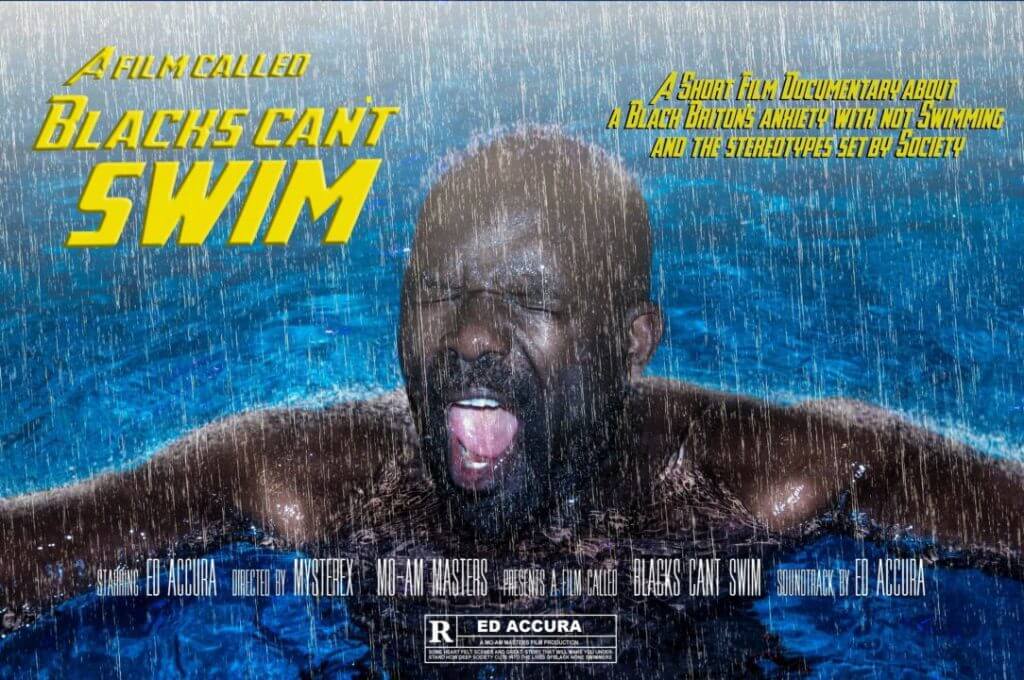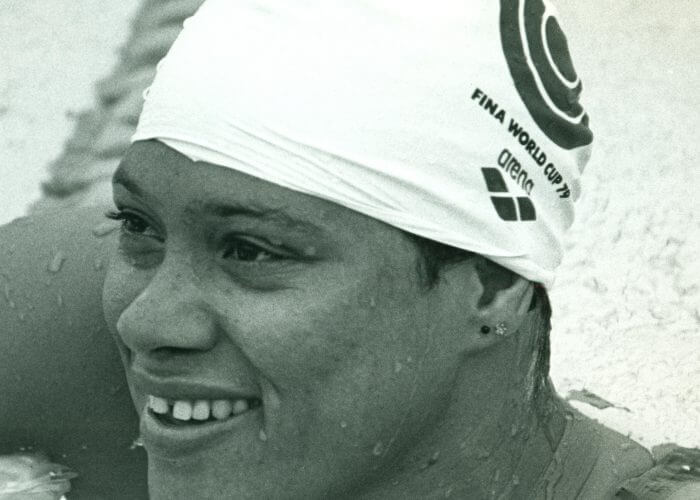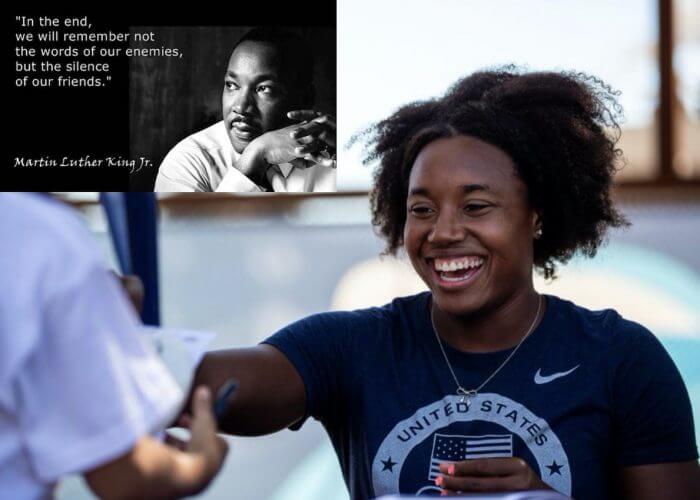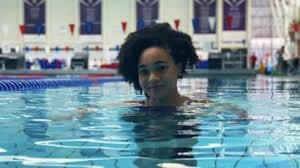A Film Called Blacks Can’t Swim Set To Go On General Release With A Timely Message Not Before Time

Ed Accura, the man behind A Film Called Blacks Can’t Swim and co-founder of the Black Swimming Association in Britain, puts his film, with a sub-line of “My Journey, My Story”, on general release next Friday, June 26.
The film is a timely reminder of the cultural barriers to swimming that endanger life as the Black Lives Matter movement gathers momentum around the world. The trailer hints at the angle Ed Accura approaches the issue from: while there have been and remain serious barriers to black participation in swimming imposed on the community, there are self-imposed cultural obstacles to overcome, too:
Blacks Can’t Swim – But, Of Course, We know They Can, and How!
Blacks Can’t Swim has been a myth perpetuated at large but also within black families themselves, Accura notes.
‘Can’t Swim’ clearly comes with a question mark and an answer.

Enith Brigitha – Photo Courtesy: ISHOF
As we know – they can: Enith Brigitha, Anthony Nesty, Anthony Ervin, Maritza Correia, Cullen Jones, Simone Manuel, Lia Neal … and anyone who ever watched the likes of Austyn Shortman streamline down the lane – race or slow pace, the aesthetic and the efficient holding hands – will contemplate Frank ‘Ed Accura’ Awuah’s film title and know a myth when they see one.
The names above are among the most successful of just a few of many world-class swimmers from a whole spectrum of ethnicity beyond definitions of ‘white’ – none of all of that recognised by water – all above those barring 1970s Dutch pioneer Brigitha and 1990s British sprinter Shortman having grown up and developed as swimmers in the world’s No1 swim nation in spite of a history stacked with explanations, myth and sad reality in the mix, as to why ‘A Film Called Blacks Can’t Swim”.
Enith Brigitha In The Hall of Fame
A moving tale – introduced by John Naber
Blacks don’t swim is what ‘Ed Accura’ is getting at in ‘Blacks Can’t Swim’ in his emphasis of ‘can’t’ in a film raising awareness of barriers built around the pond that he and those working with him aim to break down.
Frank and guests aren’t the first to do that but what sets ‘Blacks Can’t Swim’ apart is this: just one of the many witnesses to why the myth of ‘can’t’ underpins the reality of ‘don’t’ is white.
Here is a film that takes the issue to those most affected on a journey of discovery triggered for Ed by news that Biblical downpours were causing an alarming rise in water levels and the view of the fictional presenter noting that the swimmer would stand the better chance of surviving.
Ed faces his fear: water, never learned to swim. His film focusses largely on the conversations he has with a community of people able to look in the mirror of experience and understand the nature of barriers and, in many cases, who put them there.
Barriers To The Water
Here’s a taste of some of the barriers built by the black community itself, according to the bright, articulate witnesses who talked to Ed in the film:
- swimming was “too hard”
- parents didn’t swim so there was no encouragement
- some parents actively discouraged swimming as something ‘we don’t do’
- genetics: one of the reasons give for why ‘we don’t do’ was ‘our bones are more dense, we’re heavier, don’t float so well: can’t swim’
- expense: it was just too much money to go to regular lessons or go swimming on a regular-enough basis to improve to a level where effort turns to fun and confidence: all of which adds up to “swimming is seen as a middle-to-upper class thing” and not something parents who work 12-hour shifts can even contemplate when it comes to finding time to take their children to swim lessons or a fun swim
- geography: some places in Britain did not place swimming on the school curriculum, while others did, one witness noting that it was only when the family moved from south to north London that swimming was even possible (facilities and opportunity) because it was a part of the school day
huge effort to dry hair that doesn’t dry easily - being ashamed that they weren’t very good, or that they were in a minority in an environment in which they felt that difference more keenly as children
- “culturally, we don’t see it as a priority”
- no ‘figurehead’ and role model: one witness trawled through big names in other sports, such as Tiger Woods, Serena Williams, Lewis Hamilton, Usain Bolt and others … and then noted that such mega-successful black role models did not exist in swimming.
In fact, that has more to do with the status of the sport not the athlete. Swimming is a sport whose heroes are less visible in the world than the heroes of golf, tennis, F1, football, basketball and other pro-sports across the world.
Decades of ‘development’ programs run by the likes of FINA have done little, in many places nothing, to narrow the gap between the best and the rest. Even beyond the era of Michel Phelps and the headlines he generated in waves, swimming remains a sport in which 20 to 30 nations make the medals on all major occasions. Track and Field has double the number of nations making the medals.
Few beyond those top 20-30 in the pool ever threaten the podium and well over 100 nations never get anywhere close, don’t make it past prelims and remain just as far back on the conveyor belt of ‘progress’ as they were when Enith Brigitha was being blocked on her trajectory to historic Olympic gold by the ‘winners’ and victims of State Plan 14:25.

Simone Manuel – a role model for equality and inclusion and willing to speak up in the way Martin Luther King advocated – Photo Courtesy: USA Swimming
Simone Manuel made history in the Olympic pool in Rio de Janeiro in 2016 when, by winning the women’s 100m freestyle final in a match with Canadian Penny Oleksiak, she became the first black woman to win gold in an individual swimming event.
Here’s what the 20-year-old American had to say while wiping away tears:
“It means a lot to me. This medal is not just for me, it’s for some of the African-Americans who have come before me and inspired me. I hope I’m an inspiration to others to get out there and try swimming. You might be pretty good at it. It means a lot, especially with what is going on in the world today. Some of the issues with police brutality. This win kind of brings hope and change to some of the issues that are going on in the world.”
I wrote in The Times that day: “Elite swimming is a largely white sport, a fact reflected in the medals table from 2012. Nineteen countries won swimming medals in London, compared with 41 different nations in track and field.
“Forty years ago, in Montreal, Enith Brigitha became the first black swimmer to win an Olympic medal when she earned bronze in the 100m freestyle for the Netherlands. She finished behind two East German products of the state-sponsored doping programme.”

Alice Dearing: Photo Courtesy: Alice Dearing: Photo Courtesy: Instagram alicedearingx
In Britain, only a handful of swimmers from ethnic minorities have ever made the national team. The numbers have been so few that a feature in a leading British newspaper on open water swimmer Alice Dearing in the past week indicated that she would be the first black swimmer to race for Britain at the Olympic Games if she makes the team for Tokyo 2020 in 2021. She would actually be the fourth, Shortman, mentioned above, among those who made that elite cut and grade.
Manuel’s success was possible because she was encouraged by those around her who knew better than to believe the myths, who knew that the child standing on the deck in front of them, learning in the lanes, had talent, was enthusiastic, wanted more. For her, right time, right place, right people, right opportunities, right sport.
As one witness in ‘Blacks Can’t Swim’ puts it:
“.. if a parent doesn’t tell its child to be scared of spiders, it won’t be”. In other words, don’t tell a child it can’t do something, it can’t swim because even if the child tries, the process will be all the more difficult.”
On genetics, ‘Ed’ and one of his guests get to the bones of it when they note “It’s a skill”, one that anyone can learn, regardless of ethnicity, social/economic background.
A targeted project that has been largely privately funded, Frank ‘Ed Accura’ Awuah’s Blacks Can’t Swim is about to go on general release. It is the kind of film that ought to be shown in every school, perhaps as part of that promise to provide swimming lessons to every child in Britain, for example.
Not that long ago, on the path of research, this author learned that a world-class swimmer was mocked at school for going swimming. The swimmer was teased for smelling of chlorine, for wearing “those sissy suits” (briefs) and for not making football and the like his sport of choice. A great many swimmers, of all backgrounds and ethnic origins, will recognise that scenario and the deep and lasting feelings that go with such things.
What ‘Blacks Can’t Swim’ may remind us is that the mockers as well as those they mock and put off would have enriched their lives – safety, health and fun, as well as sport for all and elite, in the mix – and those of their families by knowing more and embracing a healthier perspective on the pool.




Swimming World Is there any information available about how to access this film once it is released? Amazon Prime?
Alexis Murray https://www.amazon.co.uk/Film-Called-Blacks-Journey-Story/dp/B08B1Q74K4
Craig Lord thank you very much!